84 F. average high on July 16.
98 F. high a year ago, on July 16, 2012.
Heat Advisory in effect thru Thursday for the Twin Cities.
Heat Index near 100F this afternoon and Thursday afternoon.
Dew points drop into the 50s over the weekend.
"...According to Dr. Massoud Amin, a professor of electrical and computer engineering at the University of Minnesota, 500,000 people per day in the U.S. lose power for at least two hours..." - if you had any doubt about the fragility of the U.S. power grid you won't after reading a Popular Mechanics article excerpted below. Image credit: National Geographic.
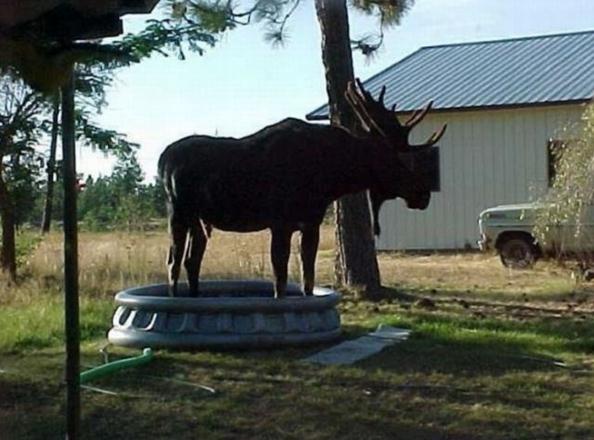
Sweaty Possibilities
I'm pausing to pay my respects to an enlightened
Muslim inventor named Ziryab, the first person to introduce underarm
deodorant, back in the 9th century, in what is now northern Spain.
According to Wikipedia
a Philadelphia man, whose name has been lost to history, was the first
entrepreneur to commercialize & patent this miracle product ("Mum"!)
in the U.S. back in 1888.
Let us give thanks.
From a tender age we've all been told "It's not
the heat, it's the humidity!" It's true. When there's this much water in
the air (dew points at or above 70) your body can't cool itself
naturally by evaporating sweat off your skin. You can overheat much more
rapidly, especially infants, the sick & elderly, and people taking
certain medications.
Recent research suggests it's not daytime highs, but consistently warm, 80-degree lows at night that cause the most mortality.
A Heat Advisory is posted into Thursday - it
will feel like 100F for this evening's Torchlight Parade. Storms
Thursday night mark the arrival of a cooler front in time for the
weekend, but long range models show highs from 92-97F the by the middle
of next week.
My advice? Slow down, avoid the midday sun, lose the tie, and check in on older friends & neighbors.
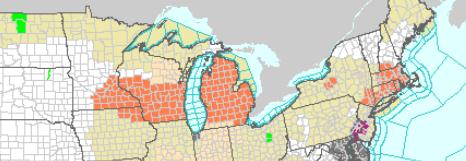 Heat Advisory. The combination of 90-degree heat and
dew points at or just above 70F will create a heat index near or just
above 100F from Minnesota to Michigan and much of the Northeast today.
Heat Advisories in orange from NOAA, an Excessive Heat Warning for the
Philadelphia area.
Heat Advisory. The combination of 90-degree heat and
dew points at or just above 70F will create a heat index near or just
above 100F from Minnesota to Michigan and much of the Northeast today.
Heat Advisories in orange from NOAA, an Excessive Heat Warning for the
Philadelphia area.
 Two Pulses of Heat. Pulse number one arrived
yesterday, and lingers into Thursday, highs in the low to mid 90s. After
cooling down over the weekend the second surge of tropical heat and
humidity arrives by Tuesday of next week, according to ECMWF (European)
guidance.
Two Pulses of Heat. Pulse number one arrived
yesterday, and lingers into Thursday, highs in the low to mid 90s. After
cooling down over the weekend the second surge of tropical heat and
humidity arrives by Tuesday of next week, according to ECMWF (European)
guidance.
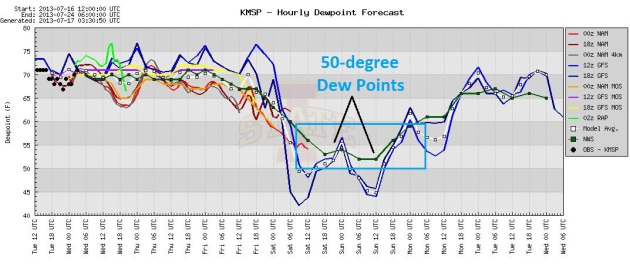 Sweet (and brief) Weekend Relief. Dew points hold
near 70F today and tomorrow, dipping into the 50s by Saturday night and
Sunday morning. That means by the weekend there will be roughly HALF as
much water in the air. A rerun of the muggies returns early next week,
so enjoy the well-timed break. Graphic: Iowa State.
Sweet (and brief) Weekend Relief. Dew points hold
near 70F today and tomorrow, dipping into the 50s by Saturday night and
Sunday morning. That means by the weekend there will be roughly HALF as
much water in the air. A rerun of the muggies returns early next week,
so enjoy the well-timed break. Graphic: Iowa State.
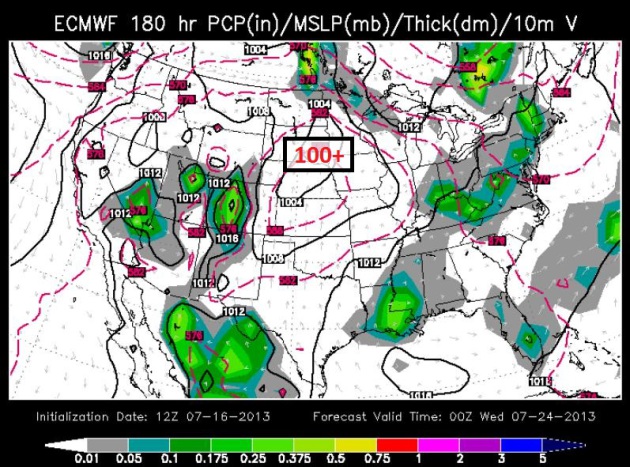 Even Hotter Next Week? It's too early to say with
anything approaching confidence, but the ECMWF model shows an even
hotter bubble of air expanding northward across the Plains by Tuesday
and Wednesday of next week. If this forecast verifies (582 to 586
thicknes) highs may approach 100F in the Twin Cities by Tuesday and
Wednesday of next week, followed by a slight cooling trend late next
week. Yes, it looks like we'll see a real summer after all. Map valid
next Tuesday evening, July 23, courtesy of WSI.
Even Hotter Next Week? It's too early to say with
anything approaching confidence, but the ECMWF model shows an even
hotter bubble of air expanding northward across the Plains by Tuesday
and Wednesday of next week. If this forecast verifies (582 to 586
thicknes) highs may approach 100F in the Twin Cities by Tuesday and
Wednesday of next week, followed by a slight cooling trend late next
week. Yes, it looks like we'll see a real summer after all. Map valid
next Tuesday evening, July 23, courtesy of WSI.
92 F. high in the Twin Cities Tuesday.
84 F. average high on July 16.
98 F. high a year ago, on July 16, 2012.





92 F. high in the Twin Cities Tuesday.
84 F. average high on July 16.
98 F. high a year ago, on July 16, 2012.
Last week, the world reeled at the thought of a powerful hurricane
creating freak tornadoes that would scoop up dozens of man-eating
sharks and deposit them onto dry land. The idea of a sharknado probably
never occurred to anyone outside of the production offices of The Asylum, until the Syfy Original Movie Sharknado hit the air on July 11th.
The movie tells the (possibly) unlikely story of a global-warming-fueled hurricane that strikes the coast of Southern California. This unprecedented hurricane spawns a line of tornadoes that fling sharks across Los Angeles, and the only people who can stop them are Ian Ziering and Tara Reid. Were this real life, we’d be screwed. (Pinning humanity’s hope on drop outs from Beverly Hills 90210 and the American Pie franchise has almost never worked out.)
However, that got us thinking: should we be worried about a Sharknado really happening? Shouldn’t we be planning for its imminent arrival?
- See more at: http://www.filmschoolrejects.com/features/what-state-is-at-the-highest-risk-for-a-real-sharknado.php#sthash.WEo8wmzR.dpuf
The movie tells the (possibly) unlikely story of a global-warming-fueled hurricane that strikes the coast of Southern California. This unprecedented hurricane spawns a line of tornadoes that fling sharks across Los Angeles, and the only people who can stop them are Ian Ziering and Tara Reid. Were this real life, we’d be screwed. (Pinning humanity’s hope on drop outs from Beverly Hills 90210 and the American Pie franchise has almost never worked out.)
However, that got us thinking: should we be worried about a Sharknado really happening? Shouldn’t we be planning for its imminent arrival?
- See more at: http://www.filmschoolrejects.com/features/what-state-is-at-the-highest-risk-for-a-real-sharknado.php#sthash.WEo8wmzR.dpuf
Last week, the world reeled at the thought of a powerful hurricane
creating freak tornadoes that would scoop up dozens of man-eating
sharks and deposit them onto dry land. The idea of a sharknado probably
never occurred to anyone outside of the production offices of The Asylum, until the Syfy Original Movie Sharknado hit the air on July 11th.
The movie tells the (possibly) unlikely story of a global-warming-fueled hurricane that strikes the coast of Southern California. This unprecedented hurricane spawns a line of tornadoes that fling sharks across Los Angeles, and the only people who can stop them are Ian Ziering and Tara Reid. Were this real life, we’d be screwed. (Pinning humanity’s hope on drop outs from Beverly Hills 90210 and the American Pie franchise has almost never worked out.)
However, that got us thinking: should we be worried about a Sharknado really happening? Shouldn’t we be planning for its imminent arrival?
- See more at: http://www.filmschoolrejects.com/features/what-state-is-at-the-highest-risk-for-a-real-sharknado.php#sthash.WEo8wmzR.dpuf
The movie tells the (possibly) unlikely story of a global-warming-fueled hurricane that strikes the coast of Southern California. This unprecedented hurricane spawns a line of tornadoes that fling sharks across Los Angeles, and the only people who can stop them are Ian Ziering and Tara Reid. Were this real life, we’d be screwed. (Pinning humanity’s hope on drop outs from Beverly Hills 90210 and the American Pie franchise has almost never worked out.)
However, that got us thinking: should we be worried about a Sharknado really happening? Shouldn’t we be planning for its imminent arrival?
- See more at: http://www.filmschoolrejects.com/features/what-state-is-at-the-highest-risk-for-a-real-sharknado.php#sthash.WEo8wmzR.dpuf
TODAY: Heat Advisory. Hot sun, sticky. Feels like 100+ Dew point: 70. Winds: SW 10-15. High: 95
WEDNESDAY NIGHT: Partly cloudy and sultry. Low: 76
THURSDAY: T-storms north. Steamy sun central and southern MN. Metro heat index 100F again. High: 94
FRIDAY: Early thunder, then turning cooler and less humid. Wake-up: 75. High: 85
SATURDAY: Comfortable sunshine. The nicer day of the weekend. Dew point: 55. Wake-up: 62. High: 78
SUNDAY: More clouds, rather unsettled, Risk of a passing T-shower or two. Wake-up: 59. High: 83
MONDAY: Sticky, few T-storms. Dew point: 68. Wake-up: 66. High: 87
TUESDAY: Hot sun returns. Feels like 95-100F by afternoon. Wake-up: 69. High: 94
Climate Stories...

This Film Will Convince Every Skeptic That Climate Change Is Real. Maybe not - you have to be open to new data and be willing and able to change your mind. Not everyone is capable of that; their minds are made up and they will cherrypick any and all questionable data to support their views. More facts, more data doesn't necessarily convince them of anything. The man behind the "Chasing Ice" documentary, James Balog, was once a skeptic. Until he saw the impact of climate change on the Arctic with his own eyes. If you're still skeptical and you read one article about climate change in the next year, this should be the one. Here's a clip from Business Insider: "photographer James Balog went from being a climate-change skeptic to documenting our planet's rapidly melting glaciers. In the 2012 film"Chasing Ice" he gathers irrefutable evidence that climate change is real. Until recently, Balog thought climate change was only based on computer models and hyperbole. "I didn't think that humans were capable of changing the basic physics and chemistry of this entire, huge planet," he said in the film. "It didn't seem probable, it didn't seem possible." The turning point came when Balog was sent to the Arctic on an assignment for National Geographic to capture the Earth's changing landscape. This spawned a bigger project — the Expedition Ice Survey — where Balog and his team used time-lapse cameras pointed at glaciers in Europe and North America to document the effects of climate change..."

Technology As Our Planet's Last Best Hope. People ask if I'm optimistic or pessimistic about climate change. It's a daunting subject - I understand why so many people deny it, or don't want to think about it. Ultimately, in spite of plenty of gloom and doom, I'm optimistic. Technology may not save us, but it will help mitigate some of the worst impacts of a warmer, stormier climate. It may be one of the most complex problems we've ever faced, requiring not only innovation and reinvention but a social movement to point us in the right direction and make sustainability more than a buzzword or catch-phrase. The Guardian has the story; here's the introduction: "There is a new environmental agenda out there. One that is inimical to many traditional conservationists, but which is picking up kudos and converts. It calls itself environmental modernism – which for many is an oxymoron. Wasn't the environmentalism of Rachel Carson's Silent Spring, Greenpeace's warriors against industrial whaling and the nuclear industry, and efforts to preserve the world's last wild lands, meant to be the antithesis of the modern industrial world? But the prophets of ecological modernism believe technology is the solution and not the problem. They say that harnessing innovation and entrepreneurship can save the planet and that if environmentalists won't buy into that, then their Arcadian sentiments are the problem..."
Photo credit above: "Apollo 8 view of the Earth that was used on the cover of first Whole Earth Catalog." Photograph: NASA.
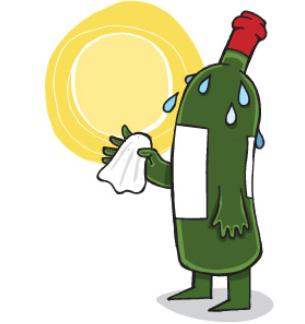 Things Climate Change May Ruin: From Allergies To Wine. Here are a few of the things The Pacific Institute's Peter Gleick is concerned about, as explained in this post at scienceblogs.com. It's a fairly long list:
Things Climate Change May Ruin: From Allergies To Wine. Here are a few of the things The Pacific Institute's Peter Gleick is concerned about, as explained in this post at scienceblogs.com. It's a fairly long list:
Beaches and Island Vacations: Ok, this one should be self-evident, since a significant amount of sea-level rise is well understood to be an unavoidable consequence of a warming planet. In addition to the serious and massive threats to lives and property, your beach vacations are also at risk. South Pacific Islands, the Caribbean, Florida, Hawaii – all will suffer beach destruction as seas continue to rise.
Chocolate: A detailed study concluded that the areas suitable for growing cocoa in the prime growing areas of Ghana and Cote d’Ivoire will substantially decrease by 2050 as warming expands. Other research also suggests risks to cocoa production from temperature and precipitation changes. (Some references here, here –a .pdf, and here )
Coffee: Coffee is one of the world’s most important and valued commodities, worth tens of billions of dollars annually and employing over 25 million people worldwide. There is now evidence that the spread of a deadly coffee fungus is linked to rising global temperatures and research shows that “nearly 100 percent of the world’s Arabica coffee growing regions could become unsuitable for the plant by 2080.” Starbucks is already having to spend money to study and test climate change-resistant coffee varieties....
Image credit above: The Wine Economist.

Methane's Contribution To Global Warming Is Not Just Hot Air. Nice visual huh? Here's a clip from a story at Earth Island Journal and Living Green Magazine: “Methane is 21 times more heat-trapping that carbon dioxide.” If you’re a frequent reader of environmental websites, no doubt you’ve seen some version of that sentence many times. The “twenty-times” figure is the most common way of explaining how methane (or CH4, or uncombusted natural gas) reacts in the atmosphere. Just one problem: It’s not entirely accurate — at least not in the time-scale we should be using to think about how to tackle greenhouse gas emissions. Actually, any CH4 released today is at least 56 times more heat-trapping than a molecule of C02 also released today. And because of the way it reacts in the atmosphere, the number is probably even higher, according to research conducted by Drew Shindell, a scientist at NASA’s Goddard Space Center. So why is the 21 times figure the one that gets bandied about? Because methane breaks down much faster than carbon dioxide..."

These Maps Show The Best Places To Put Solar And Wind Power (It's Not Where You Think). Here's an excerpt of a Washington Post story that made me do a triple-take: "At first glance, it might seem obvious where the United States should focus on building more renewable energy. Stick the solar panels in sunny Arizona and hoist up the wind turbines on the gusty Great Plains, right? Well, not necessarily. A recent study by researchers at Carnegie Mellon University offered another way to look at the issue. A solar panel built in cloudy New Jersey can actually offer more overall benefits than one built in Arizona — when you take into account all the carbon dioxide and other pollutants that get reduced. Likewise, a new wind farm in West Virginia can deliver more health benefits than one built in California, at least in the short term..."

Be A Realist. Look At The Whole Picture. Graphic above courtesy of Climate Nexus and Facebook. Greg Laden has more details at scienceblogs.com.
 Greedy, Lying Bastards" Film Now Available Digitally. Here are details from Climate Science Watch: "Greedy
Lying Bastards," a documentary film about global climate disruption
and the global warming denial machine, is now available for digital
download rental or purchase and On Demand. In addition to dramatic
footage of extreme events, the film has a large cast of characters
including leading climate scientists, a rogues gallery of right-wing
politicians, oil billionaires, and propagandists, and political leaders
and advocates who have worked to expose the denial machine and the
harm it has done. My interview and the whistleblower issues I raised
are dealt with well and accurately in one segment of the film. The Greedy Lying Bastards website has more information and a trailer for the film. For rent or purchase at Amazon Instant Video."
Greedy, Lying Bastards" Film Now Available Digitally. Here are details from Climate Science Watch: "Greedy
Lying Bastards," a documentary film about global climate disruption
and the global warming denial machine, is now available for digital
download rental or purchase and On Demand. In addition to dramatic
footage of extreme events, the film has a large cast of characters
including leading climate scientists, a rogues gallery of right-wing
politicians, oil billionaires, and propagandists, and political leaders
and advocates who have worked to expose the denial machine and the
harm it has done. My interview and the whistleblower issues I raised
are dealt with well and accurately in one segment of the film. The Greedy Lying Bastards website has more information and a trailer for the film. For rent or purchase at Amazon Instant Video."

Climate Change And Media Coverage. Here is a portion of a post focused on Reuters and it's coverage of climate change, from an environmental reporter who left Reuters: "The parlous state of Reuters' and environmental coverage is baffling and a massive disservice to paying clients. [New regime brings change of climate at Reuters]. Climate change has become one of the stories of the century and a top economic, political and humanitarian focus for the globe. Financial clients from banks, insurance firms, miners, agricultural giants to central banks and power generators want news on climate change impacts and policy. They want the best analysis on future impacts on changes in weather patterns, sea level rise and impacts on crops - i.e., food security. Climate change touches every facet of human life and every economy. It's a massive business story. Yet some people seem to view it only as a debate between climate scientists and paid-for climate sceptics and oil-industry lobbyists trying to promote business as usual. Reuters' senior managers seem oblivious to the wider picture. Climate change reportage is vital to the public and Reuters' clients, the very people editors should be doing everyting to retain as revenues falter.."
Think Progress has more on Reuters' coverage, or lack of coverage, on climate change issues here.
Climate Stories...
This Film Will Convince Every Skeptic That Climate Change Is Real. Maybe not - you have to be open to new data and be willing and able to change your mind. Not everyone is capable of that; their minds are made up and they will cherrypick any and all questionable data to support their views. More facts, more data doesn't necessarily convince them of anything. The man behind the "Chasing Ice" documentary, James Balog, was once a skeptic. Until he saw the impact of climate change on the Arctic with his own eyes. If you're still skeptical and you read one article about climate change in the next year, this should be the one. Here's a clip from Business Insider: "photographer James Balog went from being a climate-change skeptic to documenting our planet's rapidly melting glaciers. In the 2012 film"Chasing Ice" he gathers irrefutable evidence that climate change is real. Until recently, Balog thought climate change was only based on computer models and hyperbole. "I didn't think that humans were capable of changing the basic physics and chemistry of this entire, huge planet," he said in the film. "It didn't seem probable, it didn't seem possible." The turning point came when Balog was sent to the Arctic on an assignment for National Geographic to capture the Earth's changing landscape. This spawned a bigger project — the Expedition Ice Survey — where Balog and his team used time-lapse cameras pointed at glaciers in Europe and North America to document the effects of climate change..."
Technology As Our Planet's Last Best Hope. People ask if I'm optimistic or pessimistic about climate change. It's a daunting subject - I understand why so many people deny it, or don't want to think about it. Ultimately, in spite of plenty of gloom and doom, I'm optimistic. Technology may not save us, but it will help mitigate some of the worst impacts of a warmer, stormier climate. It may be one of the most complex problems we've ever faced, requiring not only innovation and reinvention but a social movement to point us in the right direction and make sustainability more than a buzzword or catch-phrase. The Guardian has the story; here's the introduction: "There is a new environmental agenda out there. One that is inimical to many traditional conservationists, but which is picking up kudos and converts. It calls itself environmental modernism – which for many is an oxymoron. Wasn't the environmentalism of Rachel Carson's Silent Spring, Greenpeace's warriors against industrial whaling and the nuclear industry, and efforts to preserve the world's last wild lands, meant to be the antithesis of the modern industrial world? But the prophets of ecological modernism believe technology is the solution and not the problem. They say that harnessing innovation and entrepreneurship can save the planet and that if environmentalists won't buy into that, then their Arcadian sentiments are the problem..."
Photo credit above: "Apollo 8 view of the Earth that was used on the cover of first Whole Earth Catalog." Photograph: NASA.

Beaches and Island Vacations: Ok, this one should be self-evident, since a significant amount of sea-level rise is well understood to be an unavoidable consequence of a warming planet. In addition to the serious and massive threats to lives and property, your beach vacations are also at risk. South Pacific Islands, the Caribbean, Florida, Hawaii – all will suffer beach destruction as seas continue to rise.
Chocolate: A detailed study concluded that the areas suitable for growing cocoa in the prime growing areas of Ghana and Cote d’Ivoire will substantially decrease by 2050 as warming expands. Other research also suggests risks to cocoa production from temperature and precipitation changes. (Some references here, here –a .pdf, and here )
Coffee: Coffee is one of the world’s most important and valued commodities, worth tens of billions of dollars annually and employing over 25 million people worldwide. There is now evidence that the spread of a deadly coffee fungus is linked to rising global temperatures and research shows that “nearly 100 percent of the world’s Arabica coffee growing regions could become unsuitable for the plant by 2080.” Starbucks is already having to spend money to study and test climate change-resistant coffee varieties....
Image credit above: The Wine Economist.
Methane's Contribution To Global Warming Is Not Just Hot Air. Nice visual huh? Here's a clip from a story at Earth Island Journal and Living Green Magazine: “Methane is 21 times more heat-trapping that carbon dioxide.” If you’re a frequent reader of environmental websites, no doubt you’ve seen some version of that sentence many times. The “twenty-times” figure is the most common way of explaining how methane (or CH4, or uncombusted natural gas) reacts in the atmosphere. Just one problem: It’s not entirely accurate — at least not in the time-scale we should be using to think about how to tackle greenhouse gas emissions. Actually, any CH4 released today is at least 56 times more heat-trapping than a molecule of C02 also released today. And because of the way it reacts in the atmosphere, the number is probably even higher, according to research conducted by Drew Shindell, a scientist at NASA’s Goddard Space Center. So why is the 21 times figure the one that gets bandied about? Because methane breaks down much faster than carbon dioxide..."
These Maps Show The Best Places To Put Solar And Wind Power (It's Not Where You Think). Here's an excerpt of a Washington Post story that made me do a triple-take: "At first glance, it might seem obvious where the United States should focus on building more renewable energy. Stick the solar panels in sunny Arizona and hoist up the wind turbines on the gusty Great Plains, right? Well, not necessarily. A recent study by researchers at Carnegie Mellon University offered another way to look at the issue. A solar panel built in cloudy New Jersey can actually offer more overall benefits than one built in Arizona — when you take into account all the carbon dioxide and other pollutants that get reduced. Likewise, a new wind farm in West Virginia can deliver more health benefits than one built in California, at least in the short term..."
Be A Realist. Look At The Whole Picture. Graphic above courtesy of Climate Nexus and Facebook. Greg Laden has more details at scienceblogs.com.

Climate Change And Media Coverage. Here is a portion of a post focused on Reuters and it's coverage of climate change, from an environmental reporter who left Reuters: "The parlous state of Reuters' and environmental coverage is baffling and a massive disservice to paying clients. [New regime brings change of climate at Reuters]. Climate change has become one of the stories of the century and a top economic, political and humanitarian focus for the globe. Financial clients from banks, insurance firms, miners, agricultural giants to central banks and power generators want news on climate change impacts and policy. They want the best analysis on future impacts on changes in weather patterns, sea level rise and impacts on crops - i.e., food security. Climate change touches every facet of human life and every economy. It's a massive business story. Yet some people seem to view it only as a debate between climate scientists and paid-for climate sceptics and oil-industry lobbyists trying to promote business as usual. Reuters' senior managers seem oblivious to the wider picture. Climate change reportage is vital to the public and Reuters' clients, the very people editors should be doing everyting to retain as revenues falter.."
Think Progress has more on Reuters' coverage, or lack of coverage, on climate change issues here.
No comments:
Post a Comment